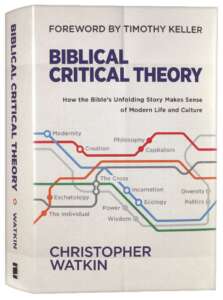When I say that everyone I know seems to be reading Chris Watkin’s book Biblical Critical Theory, or else is meaning to, that’s probably an exaggeration. But it’s certainly coming up an awful lot in conversation.
Maybe that sounds unlikely. This is a very big book (600 pages) with rather a stern title. Unless you’re into Continental philosophy or Twitter firestorms, “biblical critical theory” could seem off-puttingly academic, intimidating or boring.
Certainly, Watkin’s book is intellectually meaty. But it’s very unlike some of the abstract, impenetrable, brain-frying prose that goes by the name of cultural theory.
This is not some elitist hobby for people who enjoy philosophising, but a very practical thing.
Watkin is at ease with Derrida and Foucault, Kristeva and Lacan, Zizek and Heidegger – but rather than showing off his virtuosity, he wants to take us along with him on his quest to understand (in the words of the book’s subtitle) “how the Bible’s unfolding story makes sense of modern life and culture.” He explains things with both care and verve, every step of the way, bringing the most complex ideas within reach and making the whole thing feel like a glorious adventure.
Intrigued? As a bit of a taster, here are five things I took away from what will only be my first reading of Biblical Critical Theory:
1. You have a social or cultural theory.
Even if you think you don’t have or need such a thing (and therefore that this book isn’t relevant to you), Watkin is very clear that this is not some elitist hobby for people who enjoy philosophising, but a very practical thing.
He writes that a theory of what society is, how it operates and how things should be instead “shapes what we pay attention to in ourselves and in the world from the moment we wake until the moment we fall asleep … It influences what we want out of life, what we spend our money on, and what we devote our leisure hours to. It provides a blueprint for what counts as a successful day, a successful year and a successful life … Our choice is not whether we will live in the light of a social and cultural theory or not. Our choice is which cultural theory or theories will shape the figures of our lives and our world.”
2. The Bible offers the broadest, richest, most all-encompassing and generative account of reality; the lens through which life and culture make most sense.
Critical theory and biblical study are usually two entirely separate conversations! But Watkin insists that the Bible is the best tool out there for cultural critique – and that Christians should really, therefore, be better at social theory than people who don’t avail themselves of it: “As Chesterton reminds us, the Bible ‘looks at the world through a hundred windows where the ancient stoic or the modern agnostic only looks through one.’ Let us then open the Scriptures and let the light in!”
3. There are dots waiting to be joined from every element of the Bible to our world today.
Lamech or the Tower of Babel, idolatry or exodus, prophets and kings: some of the most specific or apparently historically bound stories and concepts from the pages of Scripture are like a Mary Poppins’ bag, with unexpected resources to be drawn from their depths in order to illuminate the here and now.
4. The Bible addresses crucial questions we may not even be asking.
A biblical critical theory will have a lot to say about the hot-button issues of our day – but even more usefully, it can make visible some of the powerful undercurrents of contemporary life that we barely notice because we’re so immersed in them. Just one example from the book: our culture’s “insatiable and unending drive for efficiency,” our obsession with “technique” as the answer to our problems, “from manufacturing and education to healthcare and dating.” This obsession becomes dehumanising because, after all, “life is not efficient.” And God, rather than being “efficient,” is instead bountiful. (Want to know more? Check out chapter 7, “From Lamech to Noah.”)
5. A biblical critical theory holds essential truths in tension, even when it’s difficult.
A properly rich and robust biblical critical theory can help to get us unstuck from some of the deepest ruts we find ourselves in. So many of our most intractable disagreements today, Watkin argues, come about because we separate out two important truths, set them in opposition, and then insist on picking sides. A biblical critical theory helps us to acknowledge both truths and hold them together in tension – providing a way forward on some very fraught issues. (For example: the Bible’s vision of hope for the future cuts across both the incremental progress prized by conservatives and the revolutionary progress dreamt of by progressives. The Bible is at once more pessimistic and more optimistic than either!)
Biblical Critical Theory is essentially a “public Christianity” handbook – so, naturally, as someone who works for the Centre for Public Christianity, it’s of interest to me! But it’s a boon to anyone who wants to know what the world we live in looks like – its contours, key features, highways, pitfalls – when the lens of the Bible brings it into focus.
Natasha Moore is a Senior Research Fellow at the Centre for Public Christianity and the author of The Pleasures of Pessimism and For the Love of God: How the Church is Better and Worse than you Ever Imagined.




